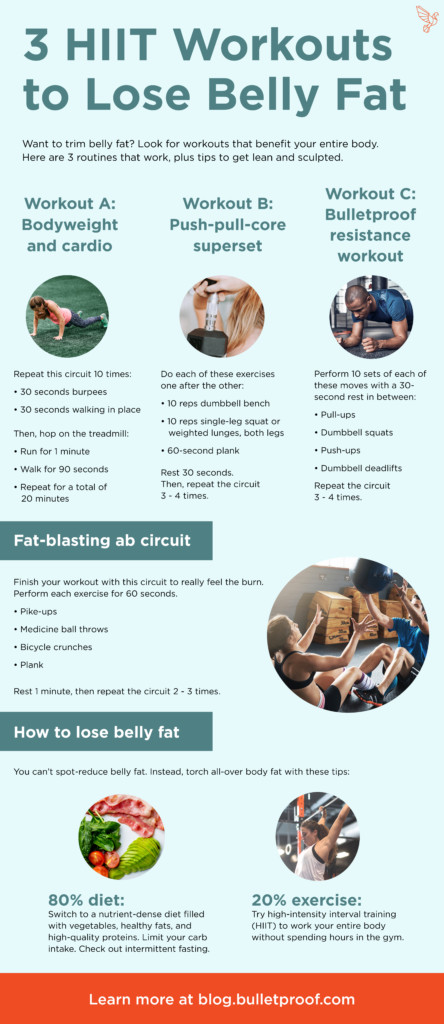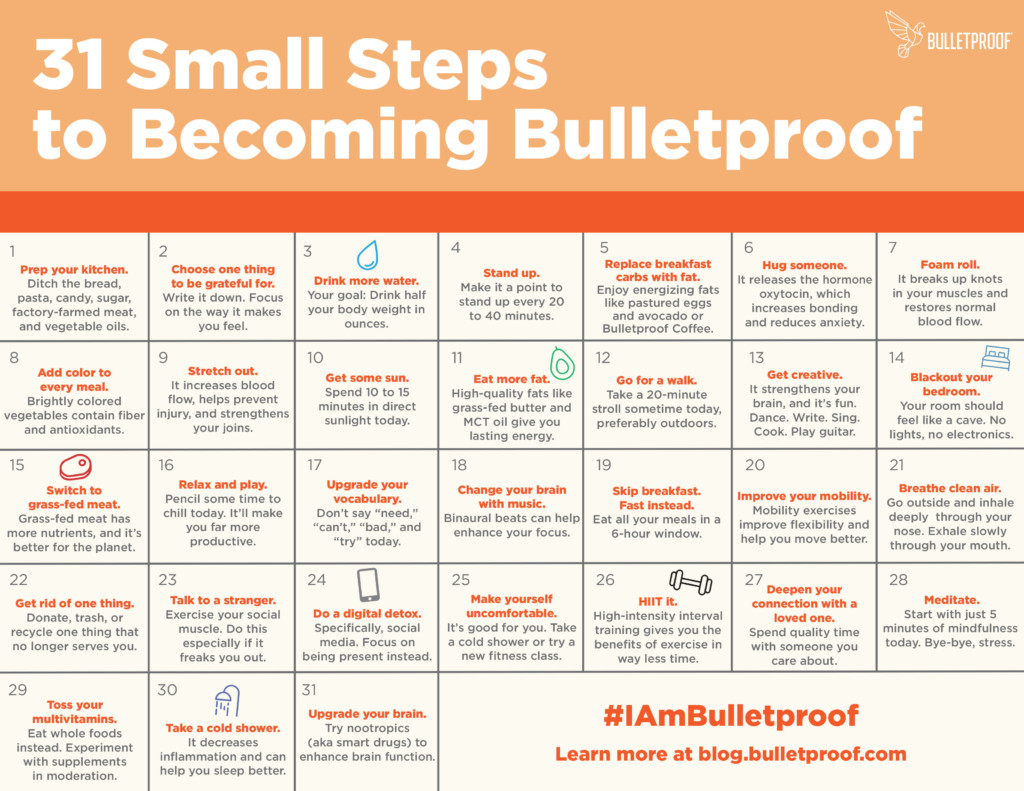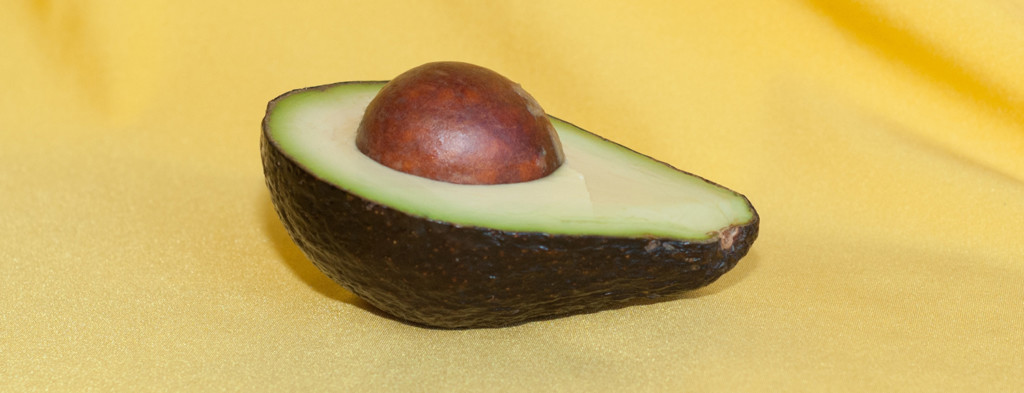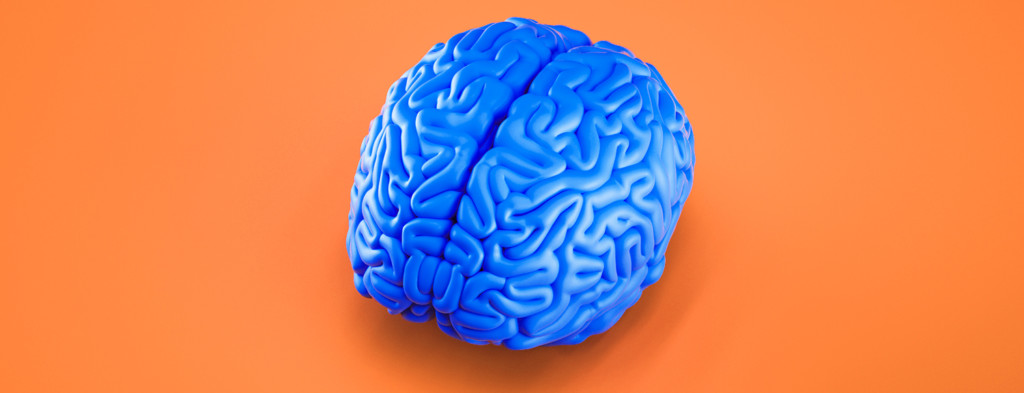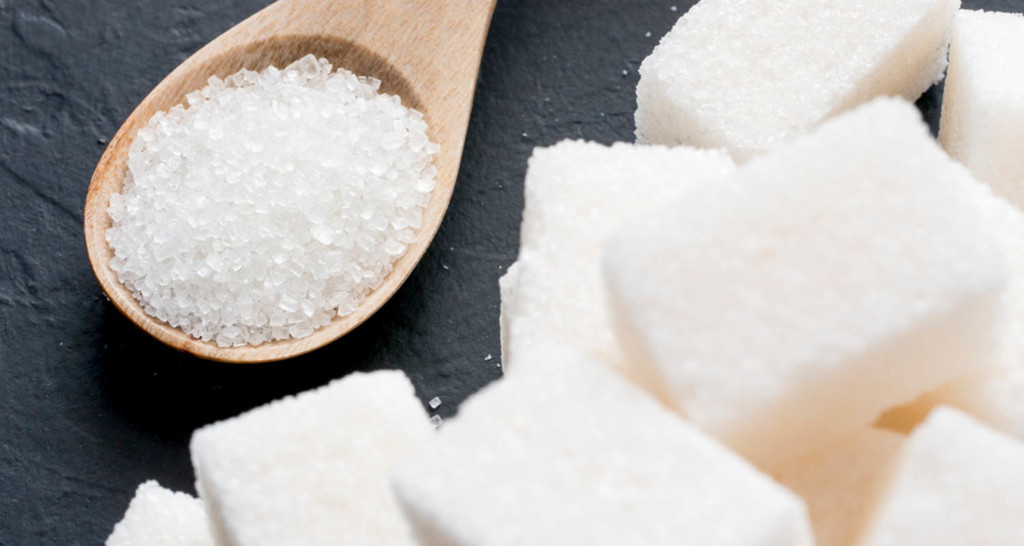[tldr]
- Core exercises are great, but if you have a layer of fat over your abs, crunches won’t help you get a six-pack.
- The secret to burning belly fat is 80% diet, 20% exercise. Switch to a nutrient-dense diet packed with vegetables, fats, and protein like the Bulletproof Diet.
- You can’t spot-treat fat. To lose extra padding, high-intensity interval training (HIIT) will torch belly fat and body fat the fastest.
- Add these killer ab exercises to your diet and workout plan, and you’ll have a six-pack in no time.
[/tldr]
Wouldn’t it be great if one workout could give you a killer six-pack? You do a few crunches, pound a protein shake, and take some gym selfies of your chiseled gains. Easy-peasy.
Of course, if it were that easy, everyone would have the body of a Greek god. That isn’t the case.
You can’t spot-treat belly fat. But here’s a secret: If you lower your body fat by building muscle and taking care of your diet, you will tighten up your core. And if you work those abdominal muscles while shedding fat, you can expose a six-pack underneath.
Here’s everything you need to know about burning belly fat, including workouts to torch fat and build killer abs.
[readmore title=”See tips & workouts”]
The ultimate way to burn belly fat

You’re about to learn the No. 1, no-nonsense way to trim stubborn fluff and become a lean, fat-burning machine. (Odds are, you already know what it is.)
“It’s 80% diet, and the other percentage is working out,” says Lacey Stone, a celebrity trainer and health and wellness expert.
Stone says that core exercises are great for building overall strength and stability, but if you have a layer of fat over your abs, all the crunches in the world won’t expose a six-pack. Losing the padding will. Switching to a nutrient-dense diet filled with vegetables, fats, and protein will torch fat better than any ab-blasting core routine.
“Palm of your hand protein. Tons of vegetables. Limited carbohydrates. Don’t drink [alcohol]. These are things that work,” Stone says. “The only way you’re going to learn that it works is if you do it for about 8 weeks. Then your body will start to shift.”
Related: How to Lose Visceral Fat, and Why It’s So Bad for You
How to reduce belly fat with exercise

Diet is a major part of the equation, but you can also lower your belly fat with a strategic workout plan. Since you can’t reduce fat in one area, you’ll have to focus on a full-body burn. The good news? That means you’ll be trim and lean all over, not just your mid-section. To torch fat, holistic nutritionist and certified personal trainer Ashley Walter recommends weight training and fasted exercise.
“Studies have found that exercising in a fasted state can burn nearly 20 percent more fat.[ref url=”https://www.cambridge.org/core/journals/british-journal-of-nutrition/article/breakfast-and-exercise-contingently-affect-postprandial-metabolism-and-energy-balance-in-physically-active-males/9DAC8DE59DEEF7926E81FF2BB2C5B7EB”] Your body likes to burn the fuel that you’ve eaten most recently. So if you don’t have any fuel because you didn’t eat, then your body turns to what it has stored — aka fat,” Walter says.
Walter suggests fasted exercise in the morning, when you’re least likely to have food in your belly.
HIIT is the best way to torch body and belly fat

If your goal is to burn fat, the quality of your sweat session makes a difference. “The ultimate workouts are rest-free, move fast, and incorporate non-repetitive full-body moves until failure,” Walter says.
Translation: Go hard until your muscles say, “no more.” Beginners should consult with their physician and a certified fitness trainer to avoid injury.
High-intensity interval training (HIIT) delivers the biggest return on your energy investment — and you don’t have to spend hours in the gym to benefit from it. HIIT combines resistance and aerobic training by alternating between periods of intense exercise and active rest in one powerful routine.
Below, you’ll find workouts that torch belly fat all over, plus targeted ab exercises for a chiseled, selfie-worthy core. Big thanks to NASM-certified personal trainers Kyra Williams and Ramsey Bergeron for their insight.
For more sample routines and tips to upgrade your workout, check out the Bulletproof Exercise Roadmap.
HIIT workouts to lose belly fat (and full-body fluff, too)
Workout A: Bodyweight and cardio

Repeat this circuit 10 times:
- 30 seconds burpees
- 30 seconds walking in place
Then, hop on the treadmill or hit the track:
- Run for 1 minute
- Walk for 90 seconds
- Repeat for a total of 20 minutes
Why it works: Burpees are a full-body workout that don’t require any equipment. You’re targeting multiple muscles as you work, which increases your overall energy expenditure. Plus, capping your workout with a HIIT sprint session will help you reap the benefits of an aerobic workout without having to go on a distance run. Ain’t nobody got time for that.
How to do a burpee:
- Stand with your feet shoulder-width apart and arms at your sides.
- Drop into a low squat.
- Put your palms on the floor directly in front of you, between your feet.
- Jump your feet straight back and land in a plank position.
- Jump your feet forward as they were in step 3.
- Straighten your arms over your head and jump upwards.
- When your feet touch the floor, immediately start the cycle again by lowering into a squat.
Workout B: Push-pull-core superset

Do each of these exercises one after the other:
- 10 reps dumbbell bench
- 10 reps single-leg squat, both legs
- 60-second plank
Rest 30 seconds. Then, repeat the circuit 3 – 4 times.
Why it works: Supersets are awesome for HIIT workouts. Instead of taking a break between moves, you perform specific exercises one after another in quick succession. According to Bergeron, “The more muscles you can safely incorporate into the exercise, the more calories it burns and the more functional it tends to be. Plus, it saves you time.”
Plus, when you superset opposing muscle groups (like you do in this workout), you maintain an elevated heart rate — which leads to a more effective fat burn. This workout uses dumbbells, but you can also use a barbell or machines.
Whatever weight you use, you should feel torched by the last rep without sacrificing safety. If you’ve never lifted weights before, it’s a good idea to work with a trainer or try a weightlifting class at a gym ahead of time. (Plus, picking up heavy things and putting them down again is fun.)
How to do a dumbbell bench press:
- Sit on a bench with the dumbbells resting on your lower thighs.
- Use your thighs to help raise the dumbbells up. Bring them to your shoulders and lie back on the bench.
- Face your palms away from you. Hold the dumbbells at the sides of your chest. Your upper arm and forearm should form a 90-degree angle.
- Exhale as you press the dumbbells up until your arms are fully extended.
- Inhale as you slowly lower the weight to your chest.
How to do a single-leg squat:
- Stand with dumbbells held to your sides. Face away from a bench. Extend one leg back and place your foot on top of the bench.
- Keep your torso upright. Exhale as you flex your front knee to squat down. The knee of your rear leg should almost touch the floor. The knee of your front leg should not pass your toe line.
- Inhale as you drive through the heel of your front leg to return to the starting position.
- Perform 10 reps, then switch legs.
How to do a plank:
- Lay belly-down on a mat. Support your weight with your toes and forearms. Your elbows should be below your shoulders.
- Hold the position. Your spine should form a straight line. To make it harder, extend a leg or arm.
Workout C: Bulletproof resistance workout

Perform 10 sets of each of these moves with a 30-second rest in between:
- Pull-ups
- Dumbbell squats
- Push-ups
- Dumbbell deadlifts
Repeat the circuit 3 – 4 times.
Why it works: Straight out of the Bulletproof Exercise Roadmap, this workout is designed to help you build muscle by hitting every major muscle group. Resistance training boosts your insulin sensitivity and metabolic rate.
How to do a pull-up:
Pull-ups are a powerful upper-body exercise because they activate your back, shoulders, and upper arms, but they can be challenging if you’re just starting out. To make it easier, use an assisted chin-up machine or ask a spotter to hold your legs.
- Grasp a pull-up bar with your hands slightly wider than shoulder-width apart. Your arms should be fully extended.
- Pull your body up until your chin is above the bar.
- Slowly lower your body back to the starting position.
How to do a dumbbell squat:
Squats are the ultimate lower-body exercise because they activate your quads, glutes, hamstrings, calves, lower back, and abdominal muscles. The steps below suggest dumbbells, but you can use a barbell, kettlebell, or machine for added resistance.
- Stand with your legs shoulder-width apart while holding dumbbells at your sides.
- Bend your knees as you lower into a squat. Keep your head up, your torso straight, and your knees pointed in the same direction as your feet.
- Descend until your thighs are parallel to the floor. Your knees should not pass over your toe line.
- Exhale as you drive through your heels to standing.
How to do a push-up:
Push-ups are a simple bodyweight exercise that activate your chest muscles, upper arms, and abdominals.
- Lie on the floor. Hold your weight on your hands with your arms fully extended. Your palms should be slightly wider than shoulder-width apart.
- Inhale as you lower yourself downward. Your chest should almost touch the floor. Your elbows should form a 90-degree angle.
- Exhale as you straighten your arms and push your body back to the starting position.
How to do dumbbell deadlifts:
Deadlifts target your hamstrings, glutes, lower back, and abdominals.
- Stand with a dumbbell in each hand. Your feet should be shoulder-width apart.
- With your knees mostly straight, hinge forward at the hips to lower dumbbells toward the tops of your feet. Your hips should move back as you hinge forward, and you should feel tension in your hamstrings.
- Extend your hips and straighten back to standing.
Ab exercises to upgrade your next workout

You’ve cleaned up your diet. You’ve found a workout routine you love. With a few targeted core exercises, you can chisel your abs to reveal that six-pack you’ve always wanted once you burn off all the extra padding. Add these high-intensity core exercises to the end of your routine.
Why save them for the end? Your abdominal muscles help stabilize your spine when you’re performing compound movements. You want them to be ready to support your core when you’re doing squats or burpees, not fatigued and burnt out. Isolate your abs at the end of your workout to safely trigger muscle growth without compromising form.
Fat-blasting ab circuit
Perform each exercise for 60 seconds, one after another. Rest 1 minute. Repeat 2 – 3 times, or until your abs feel like jelly.
- Pike-ups
- Medicine ball throws
- Bicycle crunches
- Plank
How to do a pike-up:
This ultra-effective move targets your abdominals and your hip flexors. You can do it without any equipment, but for maximum benefits, take a page out of Bergeron’s book: “I love pike-ups on a ball or with a TRX,” he says. TRX refers to suspension training ropes.
How to do it:
- Get into a push-up position with a stability ball below your shins. Your hands should be shoulder-width apart.
- Raise your hips and bend your knees. Tuck your knees to your chest as you roll your shins over the top of the ball.
- Return to the starting position by extending your hips and knees.
How to do medicine ball throws:
This exercise gets bonus fun points because you get to throw stuff. Do it with a partner or against a sturdy wall. Bergeron recommends throwing the medicine ball while your back is on a stability ball to really isolate your core and extend your range of motion.
- Sit with your knees bent and hold a medicine ball with both hands. Face a sturdy wall or your partner.
- Lie back with the ball over your head. Once the ball touches the floor, sit up and throw the ball over your head. Aim for the wall or your partner’s hands.
- Catch the ball above your head. Control the momentum as you bring the ball back down to the floor.
- Sit up and continue throwing and catching the ball.
How to do bicycle crunches:
Bicycle crunches stimulate the abs along the front and sides of your core, and they don’t require any equipment.
- Lie on the ground with your lower back flat on the mat. Get in a crunch position and place your hands on the sides of your head.
- Bring your legs up and bend your knees. Your lower legs should be parallel to the floor.
- Twist your core so your right elbow touches your left knee. As you twist, extend your right leg out.
- Crunch to the opposite side: Bring your left elbow to your right knee and extend your left leg out.
- Repeat the crunch and cycle motion. Keep your core engaged the entire time, and pedal with controlled, steady motions.
Have you tried one of these workouts? Share your experience in the comments.
